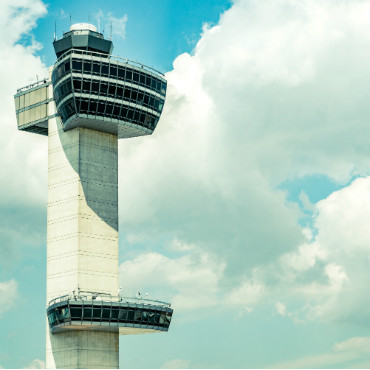Trump pushes plan to privatize air traffic control
The White House is backing long-held plans to privatize air traffic control operations to jumpstart progress on a massive technology upgrade.

The White House is backing a plan to privatize air traffic control operations, partly in the hope of expediting the Federal Aviation Administration's massive technology upgrade.
While U.S. air travel operations are among the safest in the world, American air traffic controllers still rely on a communication system that includes paper strips.
NextGen, a bundle of technologies designed to improve air traffic control, is the long-running plan to replace the paper-based communications and modernize air traffic control. However, swelling costs plus protracted and uncertain timelines have frustrated lawmakers.
At a White House event June 5, President Donald Trump announced the administration's plan to shift air traffic control operations to a nonprofit, private organization, away from FAA control.
"We're proposing to take American air travel into the future. Finally," he said. "We're still stuck with an ancient, broken, antiquated, horrible system that doesn't work. Other than that, it's quite good."
While various aviation experts have pointed to other countries' systems as models the U.S. should follow, Trump said, "there will never be anything like what we're doing," and promised more jobs and "cheaper, faster and safer travel" as a result of the reorganization.
Trump added, "we're bidding, ideally, to one great company… that can piece it all together."
DJ Gribbin, special assistant to the president for infrastructure, told reporters at a press briefing that privatizing air traffic control operations would relieve the NextGen project from the almost-annual threat of government shutdowns, allow users and developers to interact more freely and eliminate "long and circuitous federal procurement requirements."
Gribbin added that the new organization "will dramatically advance the implementation of NextGen… to help air traffic controllers move traffic through the systems." He added that this new organization could serve "as a template for how we think about infrastructure…"
Opponents, however, raised concerns that such a shift would disrupt progress made on NextGen.
Democratic lawmakers have objected to the president's proposal. Rep. Peter DeFazio (D-Ore.), ranking member of the House Transportation Committee, said at a May 23 hearing that "privatization of air traffic control is a mistake," and that there is " light at the end of the tunnel" when it comes to the NextGen project.
In response to the administration June 5 announcement, DeFazio said: "There is no consensus on this short-sighted privatization proposal. Committee Democrats are working on targeted reforms to help speed up the FAA's modernization efforts without privatizing the system. We hope these reforms will be bipartisan."
Gribbin said the administration plans for the reorganization to take three years, with the caveat that the president can "extend that deadline if needed."
Trump also said the new plan "will not need taxpayer money." Instead, he promised, the proposed nonprofit will be funded through user fees.
The proposal to spin off air traffic control dates back to the Clinton administration. In 2016, a bill introduced by Transportation Committee Chairman Rep. Bill Shuster (R-Penn.) helped revive the calls for a shift. However, that bill ran into opposition from members on both sides of the aisle because of concerns that privatizing air traffic control operations would effectively lead to enhanced roles for the major airline companies at the expense of smaller carriers and airports.





